Do you need a new go-to homemade salad dressing? Look no further than this zingy Red Wine Vinaigrette! It takes less than 10 minutes to make and elevates every dish with its gourmet flavors.
This recipe for red wine vinaigrette is my secret to taking salads from good to great. It’s zippy and tangy like most vinaigrettes but it gets taken over the top with flavor-forward ingredients like good-quality red wine vinegar, Dijon mustard, fresh lemon juice, and fresh garlic.
The refined flavors are well-balanced, making it the perfect complement to tons of salads (choose from these 30 Sublime Vegan Salad Recipes), as well as grain bowls, veggie dishes, and more.
Table of contents:
1. Why this recipe works
2. Ingredient notes
3. Step-by-step instructions
4. Tips for making this recipe
5. How to use red wine vinaigrette
6. Variations
7. Frequently asked questions
8. Recipe card with notes
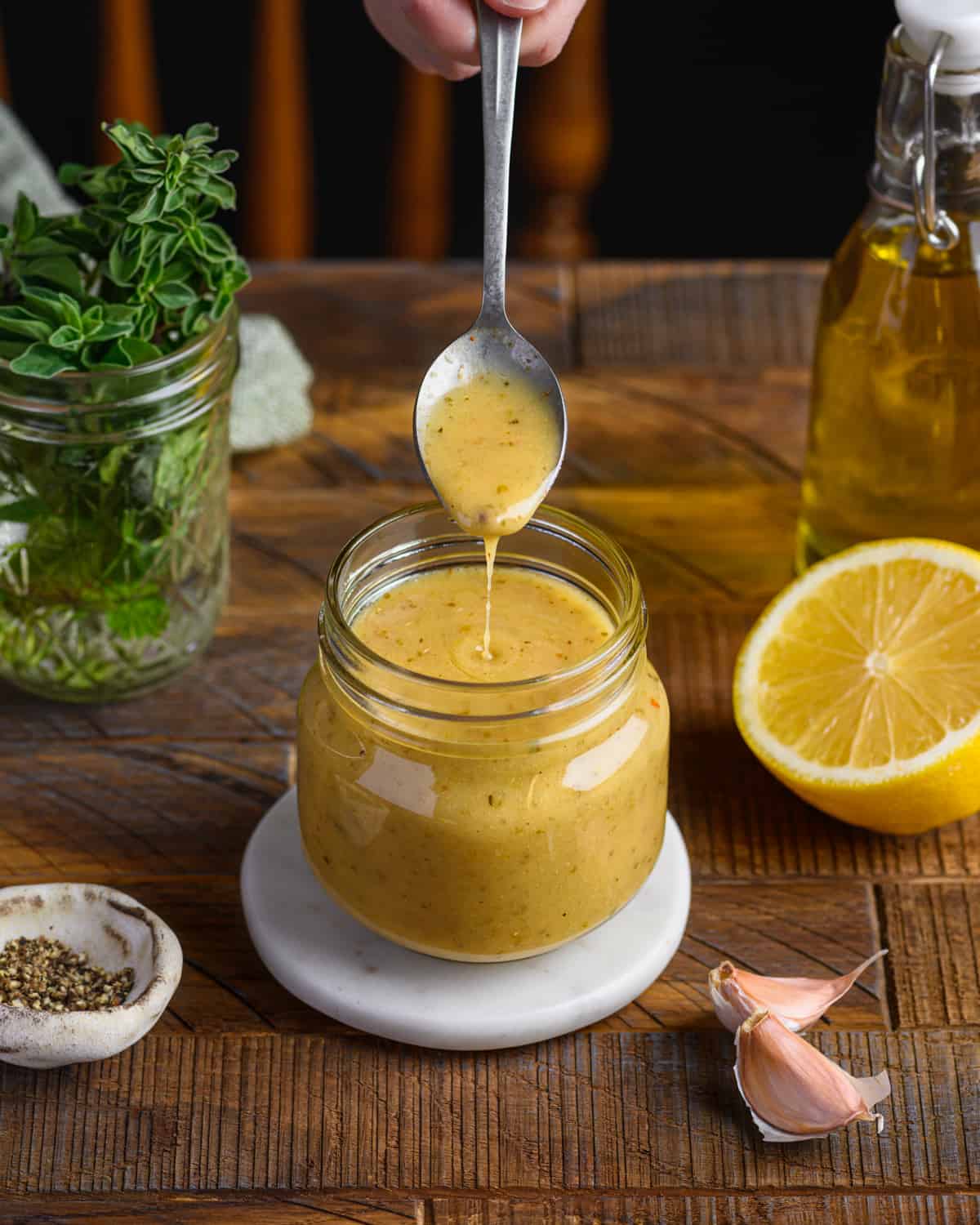
Why this recipe works
A gourmet dressing
It doesn’t take much to transform a basic red wine vinaigrette into a gourmet dressing. In this red wine vinaigrette recipe, I used just a handful of kitchen staples to upgrade its flavor.
Raw garlic brings an addictive garlicky kick and sharpness; Dijon mustard adds a sharp tang and creaminess that helps emulsify the vinaigrette; dried oregano adds a lovely herby flavor while red pepper flakes add an extra optional kick; and lastly, just a little sweet maple syrup helps balance the acidity.
These simple upgrades yield the most sophisticated and well-balanced vinaigrette. It’s tangy and tart, a tiny bit sweet, and has just the right amount of kick. Plus, it’s somewhat thick and creamy, which helps coat every bite of salad!
Perfect for salads of all kinds
Whether you’re impressing your dinner guests with an elaborate salad or whipping together a simple side salad for your weeknight meals, this vinaigrette is welcome.
Its nice balance of tangy, sweet, and tart flavors helps it pair well with hearty winter salads, like my Roasted Pumpkin Salad, as well as lighter summer salads, like my Vegan Broccoli Salad. You can even use it as a delicious marinade for grilled veggies!
Check out the Serving Suggestions below for ways to use this red wine vinaigrette.
Ultra quick
Despite its gourmet flavors and presentation, this vinaigrette comes together in just 5 to 10 minutes. Just add all your ingredients to a jar, shake it up, and that’s it!
Ingredient notes
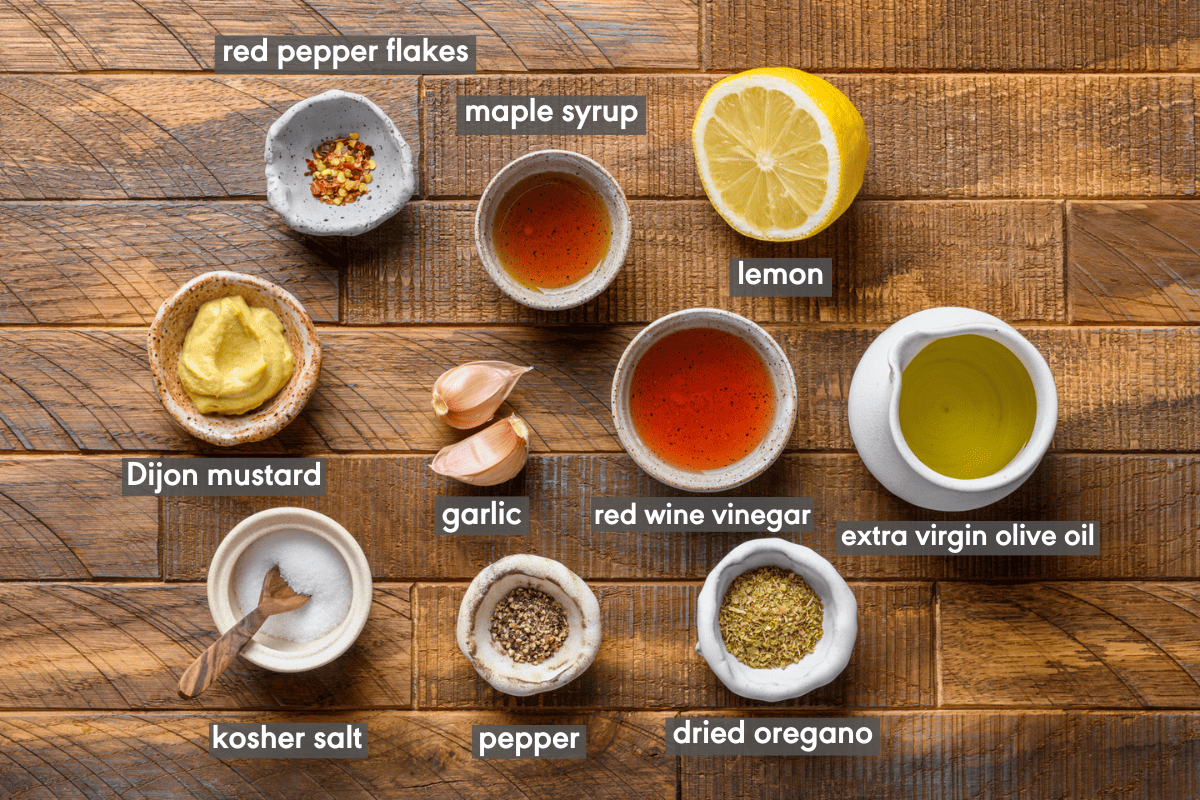
Red wine vinegar
The star of the show! Red wine vinegar has a complex, full-bodied flavor that’s tangy, fruity, and acidic, just like the red wine it was made from.
This is our go-to brand for red wine vinegar (affiliate link). Made from oak-aged red wines, it has a good flavor and is organic, sustainably farmed, and non-GMO. It’s also the best overall pick in this review of red wine vinegars from The Spruce Eats.
Lemon juice
I use freshly squeezed lemon juice in place of some of the red wine vinegar because 100% red wine vinegar can make the dressing a little too sharp and intense in flavor. Lemon juice balances these flavors and adds a lighter, fresher acidity.
Extra virgin olive oil
Because it wouldn’t be a vinaigrette without the oil. I always use extra virgin olive oil in my vinaigrettes (great flavor and healthy fats!), but feel free to use a neutral-flavored oil if you prefer a more, well, neutral-flavored vinaigrette (see the options in the Variations section).
Fresh garlic
Grated fresh garlic is one of my go-to’s in homemade vinaigrettes as well as sauces, like tahini pasta sauce and yogurt sauce. Here, its sharp and savory notes and somewhat spicy kick add a ton of great flavor.
Are you in a rush? Skip the garlic or use garlic powder instead. Just know that the dressing will be missing a certain something when you omit the fresh stuff.
Dijon mustard
Another one of my vinaigrette go-tos. Dijon mustard not only adds a complementary tang to the vinegar but it also lends a creamy consistency, which helps thicken and emulsify vinaigrettes.
Maple syrup
The sweetness from a drizzle of maple syrup rounds out the sharp and tangy flavors, making it perfectly balanced. Use real maple syrup for the best flavor!
Step-by-step instructions
Add the vinegar, lemon juice, Dijon mustard, maple syrup, garlic, oregano, red pepper flakes, kosher salt, and pepper to taste to a bowl.
Whisk well to combine.
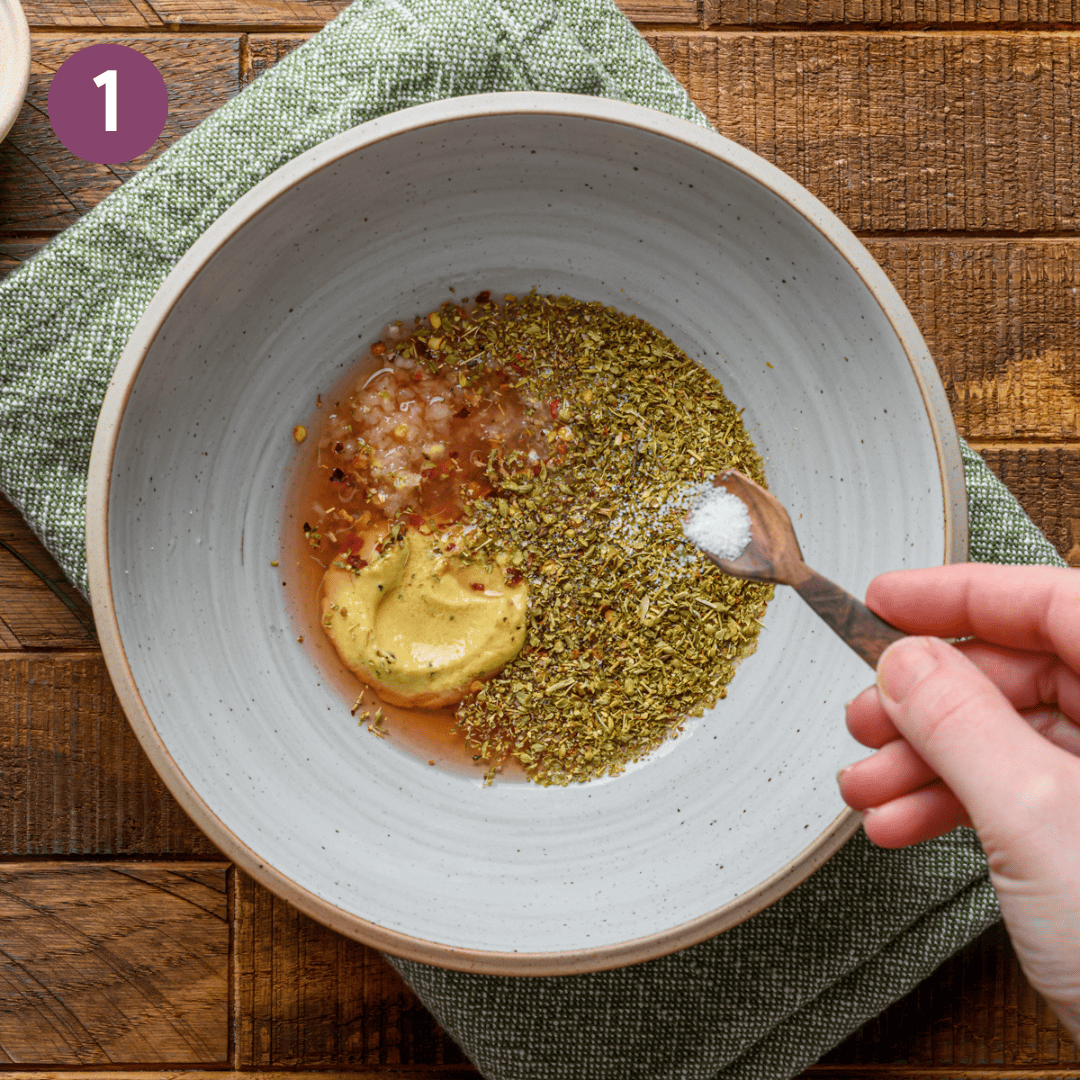
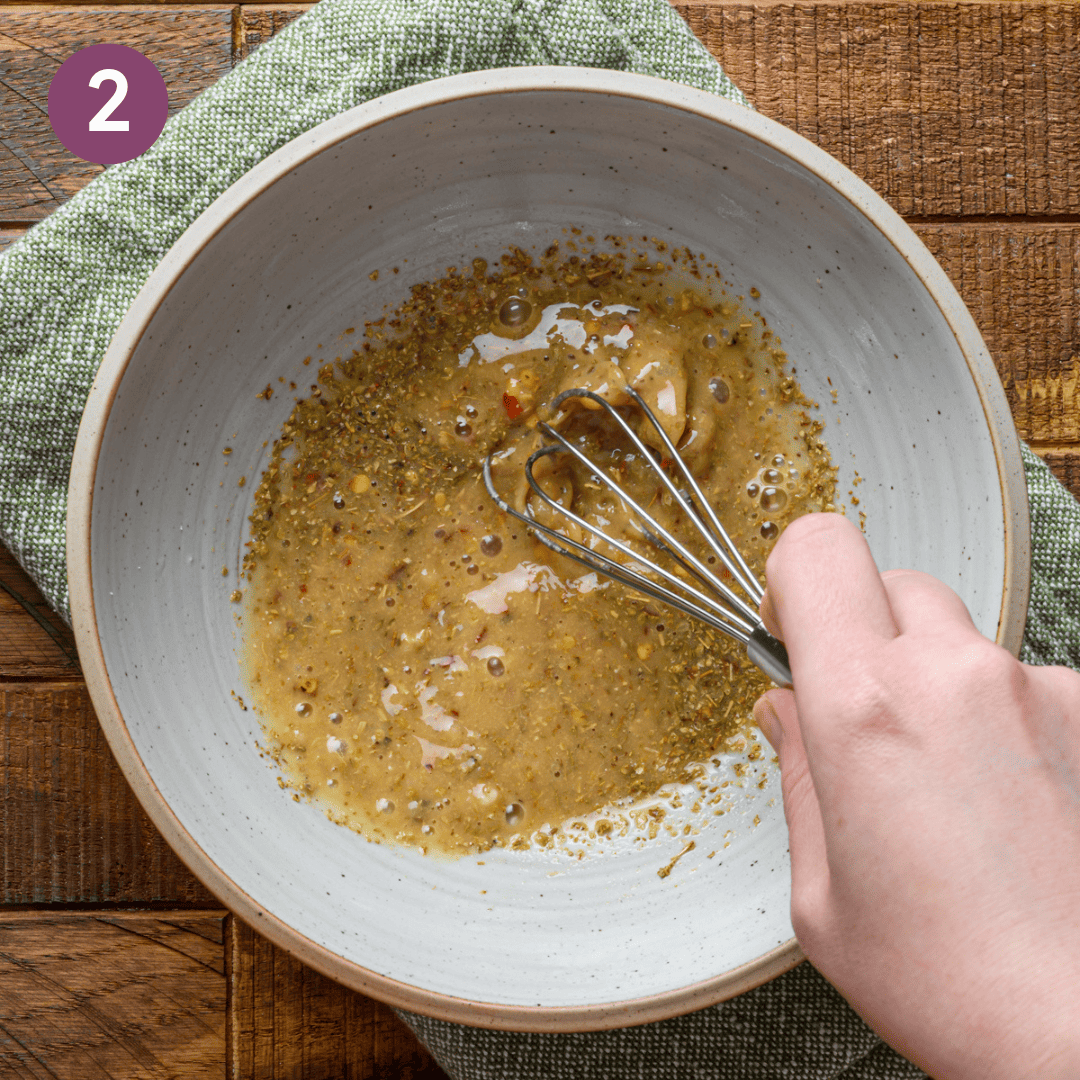
Stream in the olive oil, whisking as you go, until the vinaigrette is emulsified.
Easier option: Add all the ingredients to a jar, seal the lid on the jar, and shake vigorously to emulsify the vinaigrette.
Use the vinaigrette right away or store it in the fridge for up to 2 weeks.
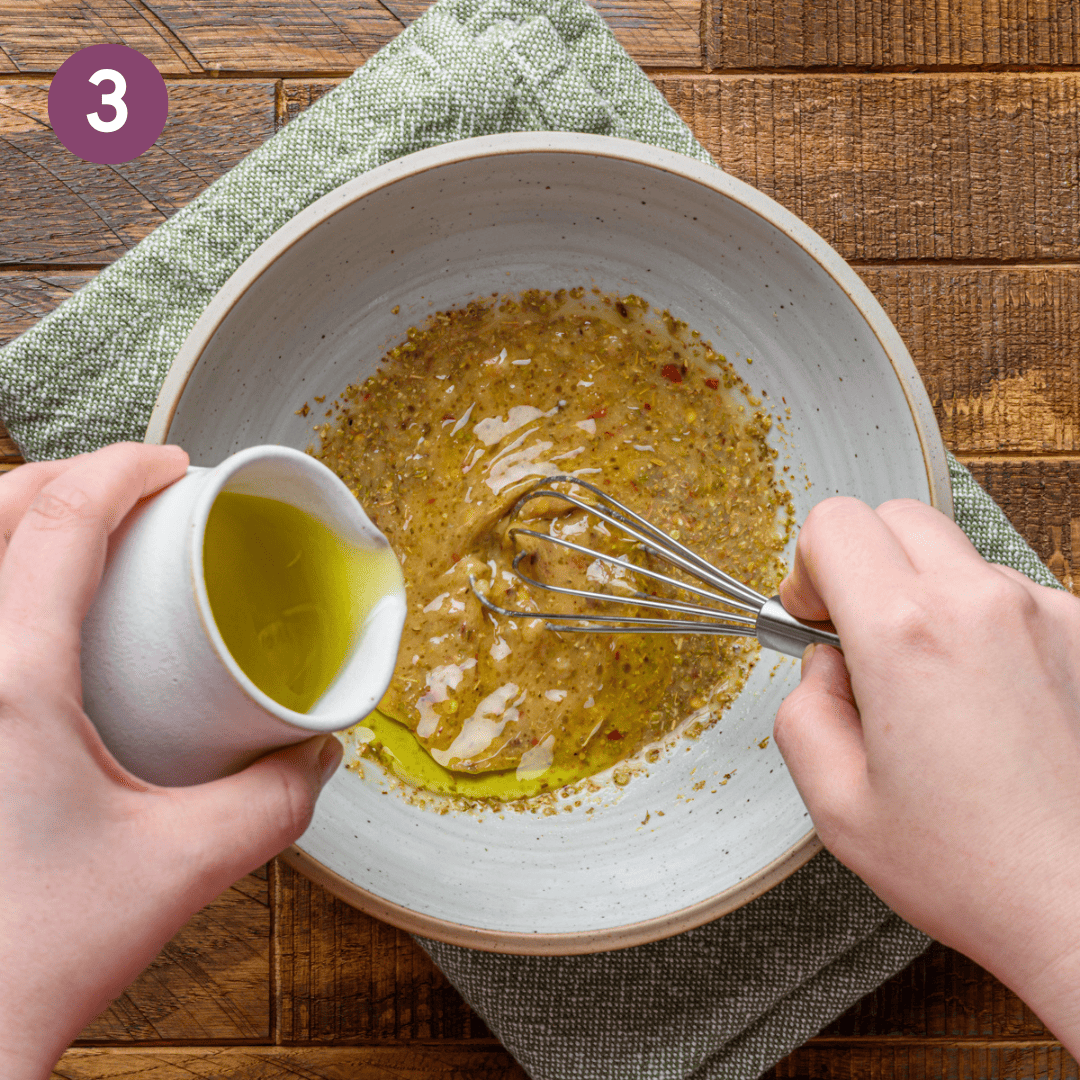
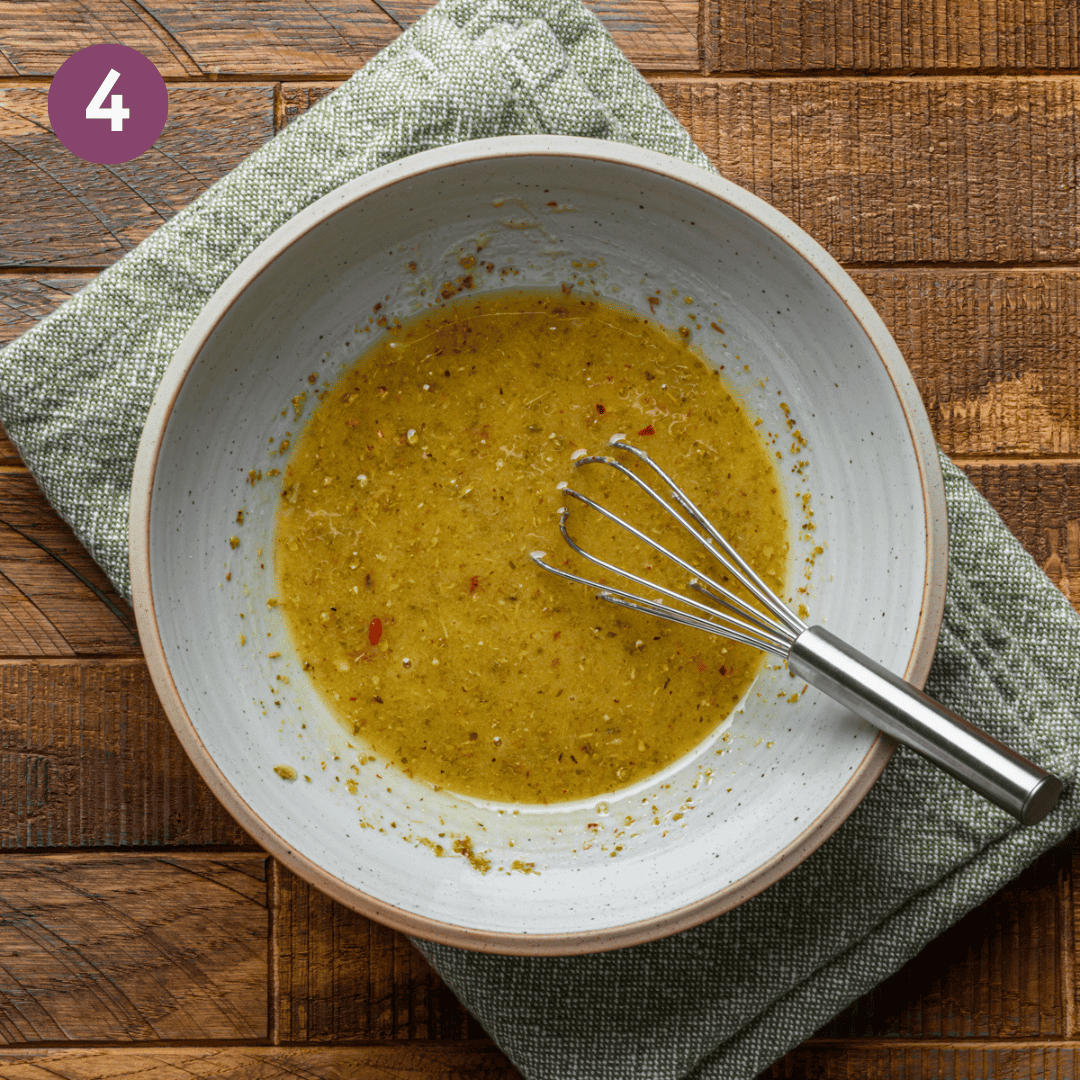
Tips for making this recipe
Shake or whisk it together
If you’re planning on storing the dressing for later, then simply shake all of the ingredients together in a jar until it’s emulsified. Fewer dishes and it’s so easy!
If you’d like to stick with tradition, add all of the ingredients to a bowl except for the olive oil. Whisk while slowly drizzling the olive oil into the bowl until the dressing is emulsified.
Start slowly, then adjust to taste
Vinaigrettes are an exercise in balance. The best practice is to start with a lesser amount of ingredients, give it a taste, and then adjust the flavors accordingly (ie: add extra lemon, salt and pepper, maple syrup, etc.).
For example, in this recipe, start with 2 teaspoons of Dijon mustard and 2 teaspoons of maple syrup. Shake up the vinaigrette, then taste and add more as desired. The same goes for the salt and pepper.
Then give it a taste and adjust the flavors as needed:
- Add more mustard for a creamy tang and more emulsion.
- Add more maple syrup for sweetness to balance the acidity.
- Add more lemon or red wine vinegar for acidity.
- Or add another pinch of salt and pepper for a balanced and well-rounded flavor.
Serve at room temperature
I recommend storing red wine vinegar dressing in the fridge; however, it’s always best served at room temperature. The oil will solidify when it’s cold, so give it time to rest and loosen on the kitchen counter before serving.
Are you in a rush? Place the sealed jar in a bowl of hot water and let it rest for 5 minutes. The vinaigrette will come back to room temperature very quickly.
Last but not least, always give the dressing a good shake before serving to help it re-emulsify.
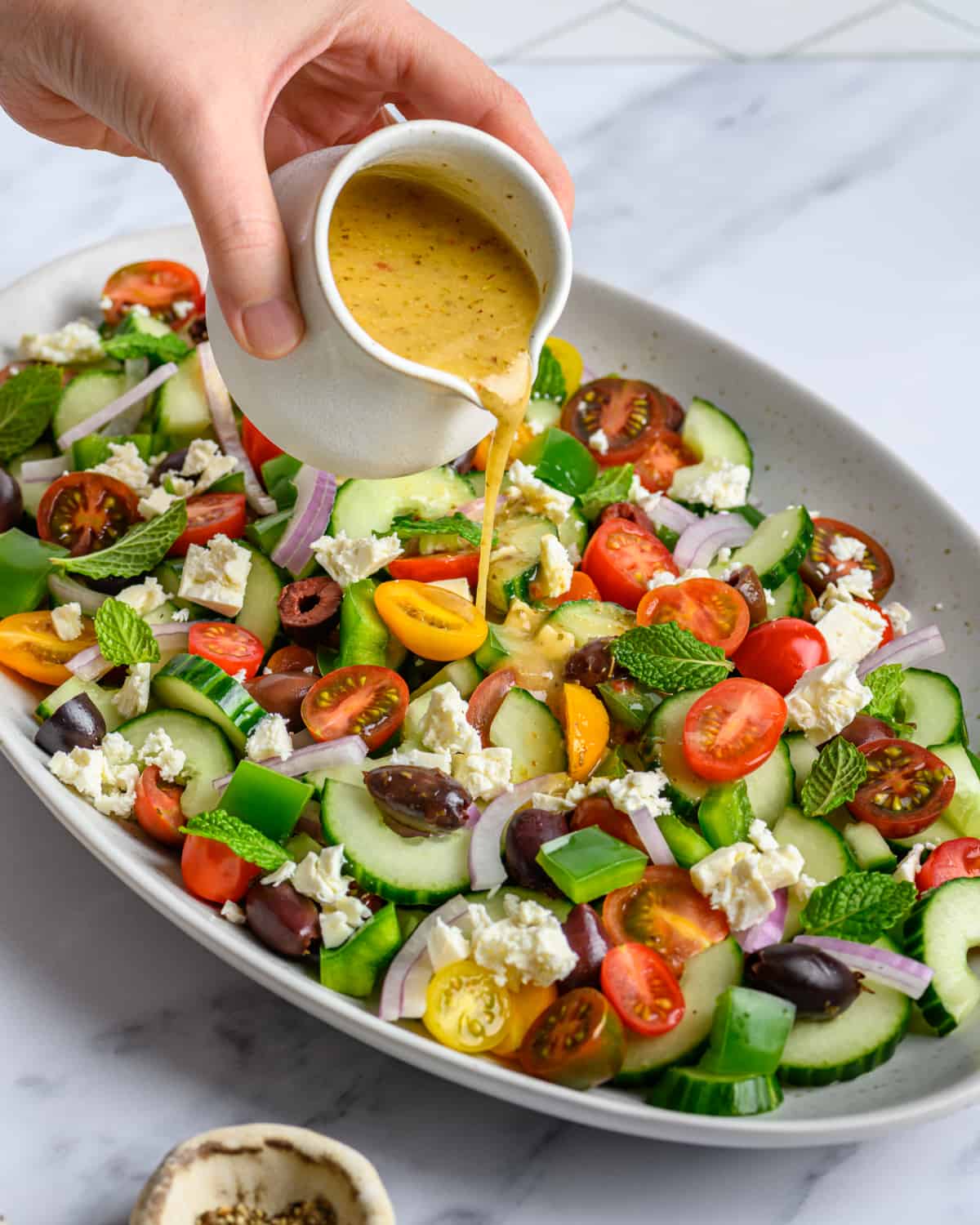
How to use red wine vinaigrette
Keep this red wine vinegar salad dressing recipe in your back pocket at all times. You’ll need it to pair with all kinds of salads, from simple green salads to extravagantly loaded salads. These serving suggestions should help inspire you:
Simple salads and side dishes
- Mixed greens or baby spinach with toasted pecans, chopped Medjool dates or dried cherries, thinly sliced red onion or shallots, and this vinaigrette.
- Arugula or watercress with thinly shaved fennel, thinly sliced or shaved Granny Smith apples, toasted walnuts, and this vinaigrette.
- Chopped romaine with halved cherry tomatoes, sliced cucumbers, handfuls of chopped parsley and dill leaves, vegan parmesan, croutons, and this vinaigrette.
- Use this vinaigrette in my Lentil Salad, Broccoli Salad, and Kale and Brussels Sprouts Winter Salad for a different flavor profile.
- Or, forget the greens and use this vinaigrette on my Lemon Orzo Pasta Salad and Quinoa Salad.
Loaded gourmet salads
- Make a classic Greek salad with this vinaigrette and my Vegan Feta! Or turn it into a Greek pasta salad by pairing the vinaigrette with room temperature cooked pasta, the Greek veggies, olives, and feta.
- For a hearty main dish, pair roasted cauliflower florets with arugula, cooked lentils, thinly sliced red onions or shallots, chopped dried apricots or pomegranate seeds, torn mint leaves, this vinaigrette, and a few drizzles of tahini.
- Use this vinaigrette to dress up my gourmet Roasted Beet and Fennel Salad, Warm Lentil Salad with Delicata Squash, or Sweet and Spicy Smashed Cucumber Salad.
More ways to use this vinaigrette
- Use it as a tangy and vibrant marinade for your summer grilled vegetables.
- Drizzle it over top of roasted or grilled veggies for a tangy pop of flavor.
- Use the leftovers as a last-minute dressing on leafy greens before stuffing them into a sandwich or wrap.
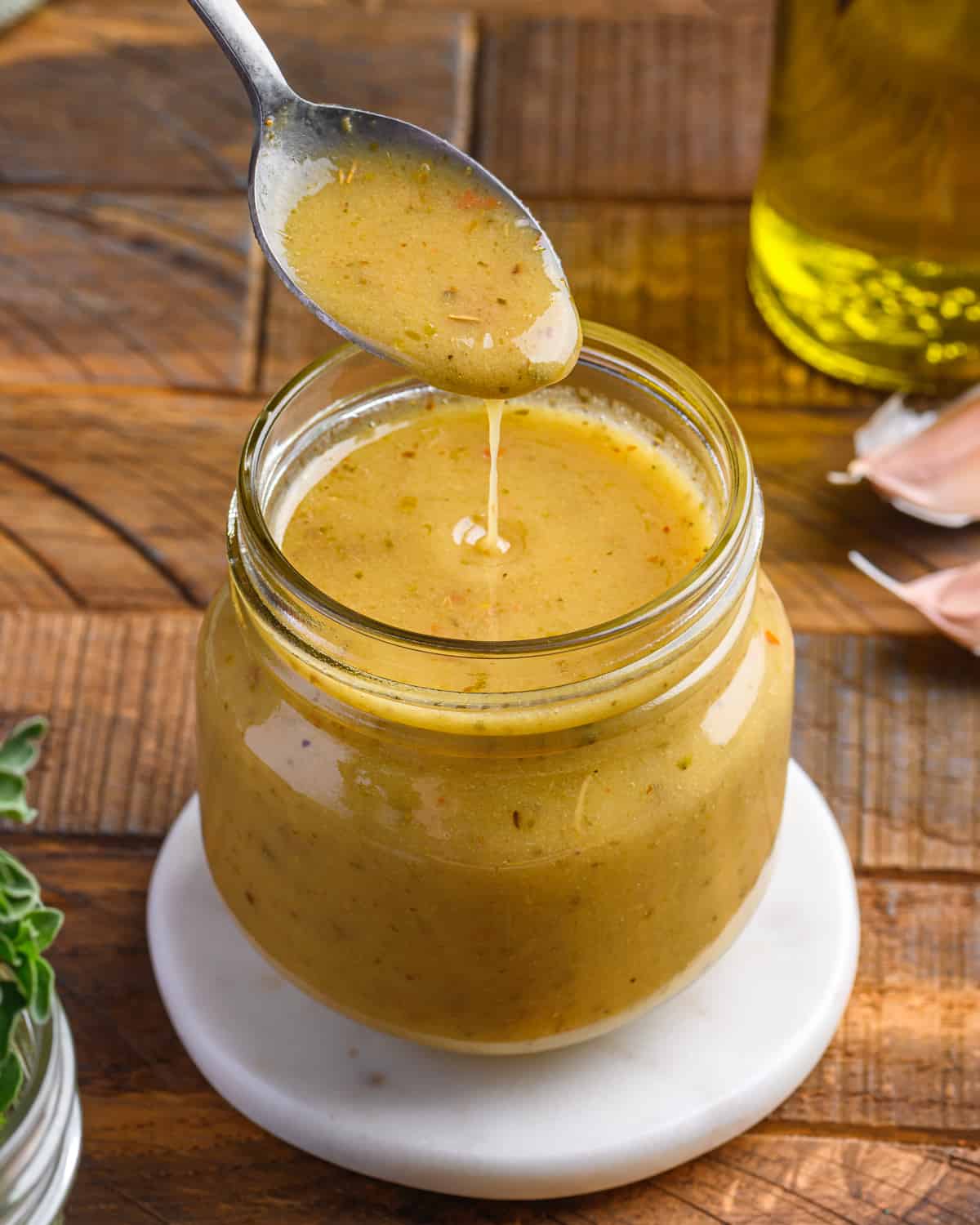
Variations
I find that extra virgin olive oil gives my vinaigrettes the most robust, well-rounded flavor. However, if you prefer a more neutral flavor profile, use avocado oil, grapeseed oil, sunflower oil, or canola oil.
Even though this is a red wine vinaigrette recipe, you can customize it with another vinegar. Try using apple cider vinegar for a fruitier dressing, white wine vinegar or champagne vinegar for something lighter, or balsamic vinegar for a more robust flavor profile.
Give it a bright and lemony pop by stirring some lemon zest into the vinaigrette before juicing.
Want to add a creamy nuttiness? Stir in 1 to 2 tablespoons of good-quality, well-stirred tahini (or substitute up to 2 tablespoons of the oil with tahini).
To make it extra tangy, add more lemon juice or more Dijon mustard.
An infused olive oil can add more depth and layers of flavor here. It would be phenomenal with basil oil (I am obsessed with this one from Brightland – affiliate link).
Do you have pomegranate molasses leftover from my Actually Good Quinoa Salad or the muhammara dip from my Mezze Platter? Replacing the maple syrup with pomegranate molasses will give the dressing a more complex and irresistible tart-sweet flavor (start with 1 tablespoon, then taste and add more as needed).
Like your vinaigrettes extra creamy? Add all the ingredients except the oil to a small-cup blender and blend, then slowly stream in the oil (you’ll need to double the recipe if your blender is not a small-cup). This is the technique I use to make my balsamic vinaigrette so thick and creamy!
Frequently Asked Questions
You’ll get about ¾ cup or 180g of dressing out of this recipe. This is enough to dress 10 to 12 cups of salad greens (remember that heartier greens, like kale or cabbage, will need more vinaigrette than softer and delicate greens, like a spring mix).
As for serving sizes, it depends on how much salad you’re serving, the type of salad greens you’re using, and how well-dressed you like your salads. This recipe could serve 6 people (2 tablespoons of dressing per person) or 8 to 12 people (1 to 1.5 tablespoons of dressing per person).
Of course! Just be sure to make the dressing in a larger jar (or bowl) and to season it with salt and pepper to your taste.
It stays fresh and flavorful for about 10 days (it may last up to two weeks) when stored in a sealed jar in the fridge.
The oil may solidify in the fridge, so it helps to set the jar on the kitchen counter until it comes down to room temperature. Are you in a rush? Put the jar in a bowl of hot water to bring it down to room temperature even faster. Shake well before serving.
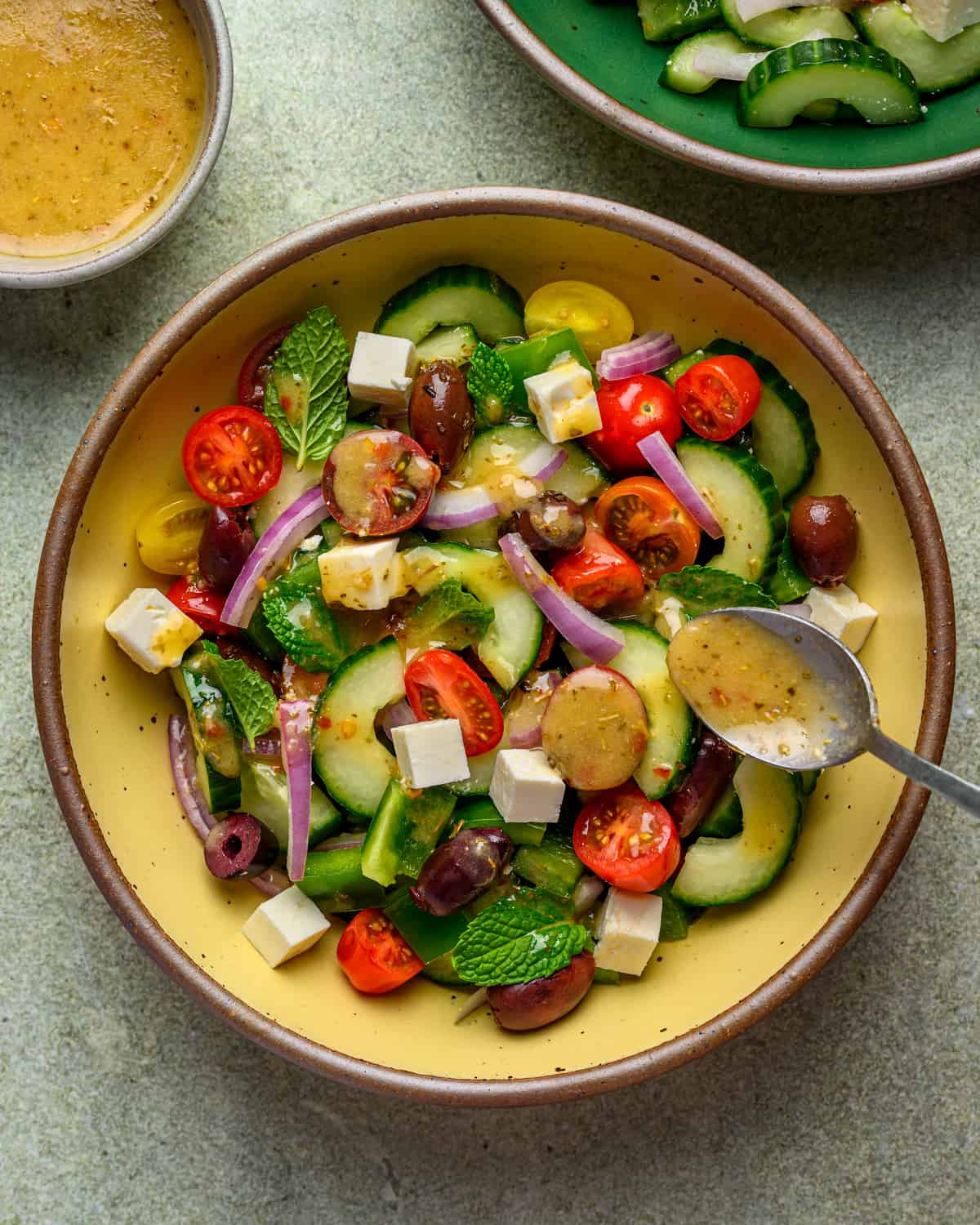
More classic dressings and sauces
If you loved this Red Wine Vinaigrette as much as we do, please be sure to leave a rating and review below 🙂

Introducing
Big Vegan Flavor
Techniques and 150 recipes to master vegan cooking.
Red Wine Vinaigrette
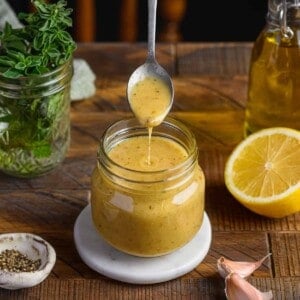
Ingredients
- 2 ½ tablespoons red wine vinegar
- 1 tablespoon freshly squeezed lemon juice plus more to taste
- 2 to 3 teaspoons Dijon mustard
- 2 to 3 teaspoons maple syrup (or agave nectar)
- 2 garlic cloves, grated, finely minced, or crushed with a press
- ½ to 1 teaspoon dried oregano
- ¼ teaspoon red pepper flakes (optional, for a kick)
- ¼ cup + 2 tablespoons (84g) extra virgin olive oil
- ½ teaspoon kosher salt, plus more to taste
- Freshly cracked black pepper
Instructions
- Add the vinegar and lemon juice to a jar for which you have a lid. Add 2 teaspoons mustard, 2 teaspoons maple syrup, garlic, ½ teaspoon oregano, red pepper flakes (if using), olive oil, ½ teaspoon kosher salt, and pepper to taste.
- Shake vigorously to emulsify the vinaigrette. Taste, adding more mustard for creamy tang and to emulsify, more maple syrup for sweetness, or more lemon juice or vinegar for additional acidity. Season to taste with more salt, pepper, or oregano as desired.
- Store vinaigrette in the sealed jar in the fridge for 1 to 2 weeks.
Video
Notes
- You can also use a bowl to make the vinaigrette (the more classic method). Add all of the ingredients except for the olive oil to a bowl. Slowly drizzle in the oil, whisking as you go, until emulsified.
Nutrition
Nutrition information is automatically calculated, so should only be used as an approximation.


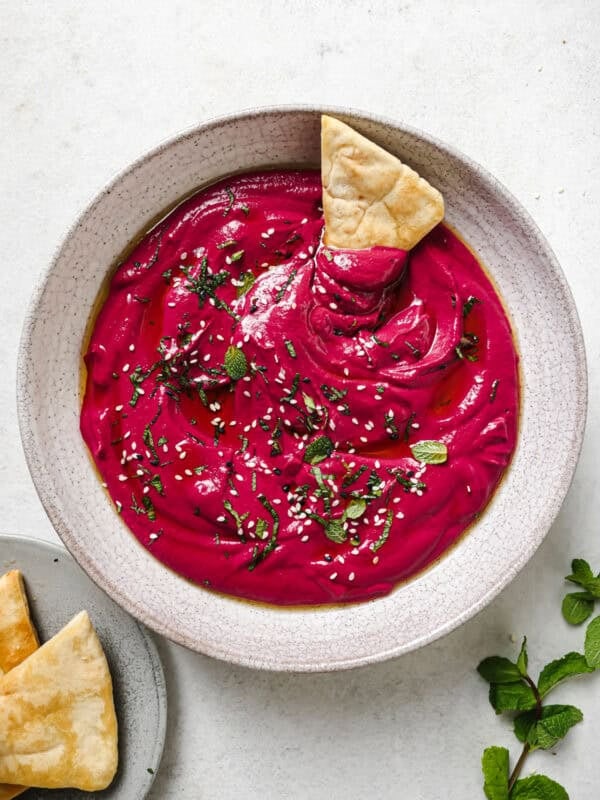
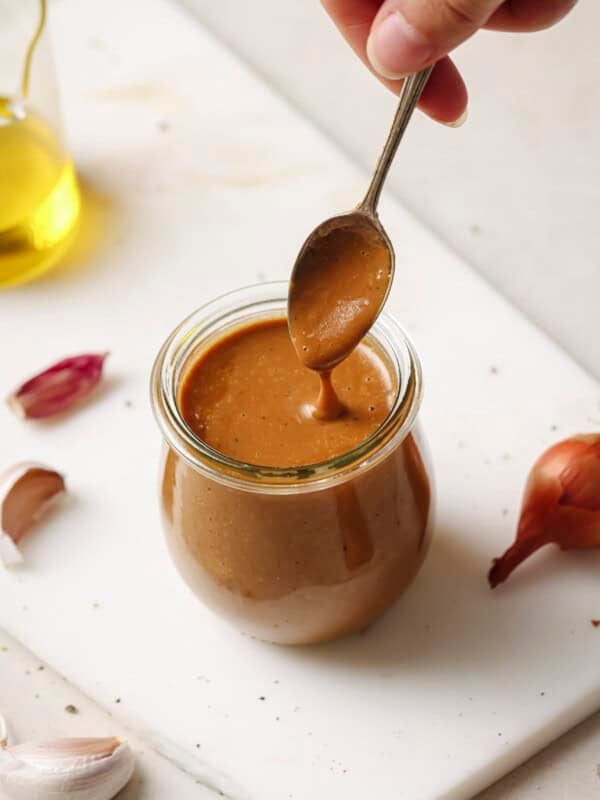
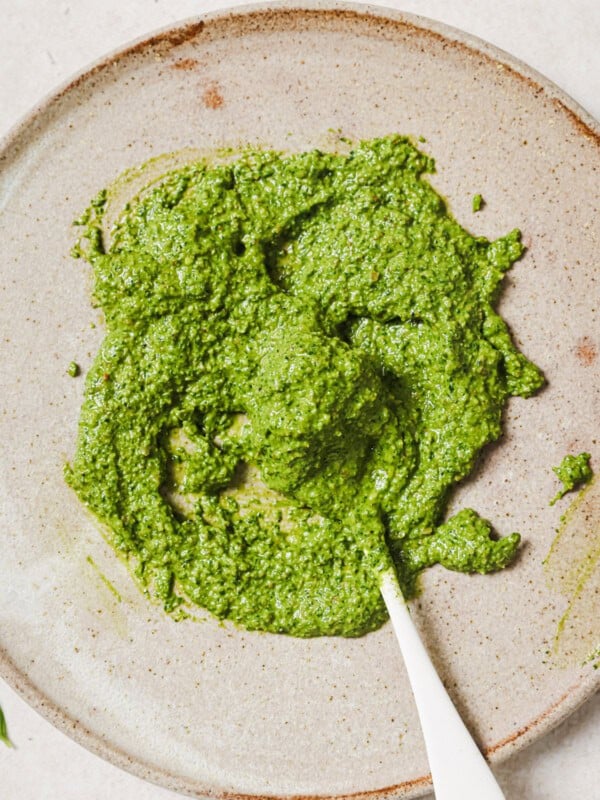
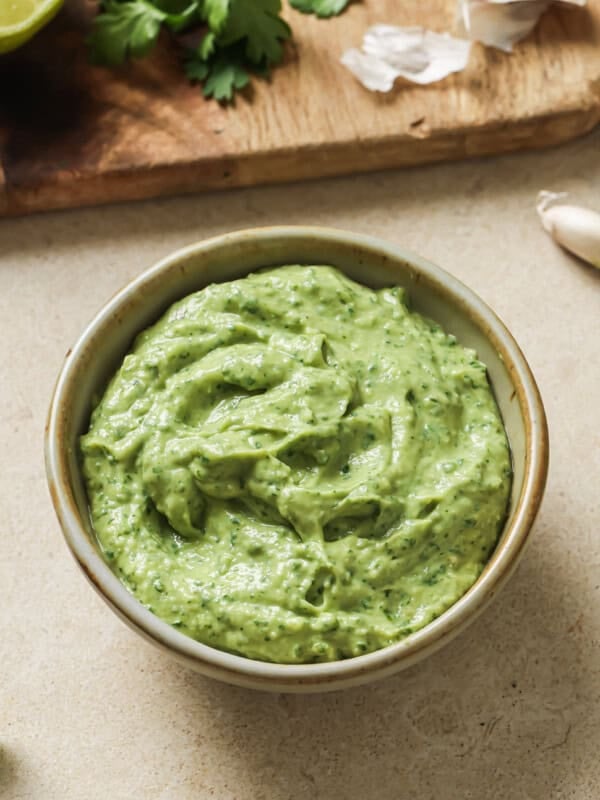









We LOVE this dressing and have been using it for our work lunch salads for over a year! Since we go through it so much I usually quadruple the recipe and use 3/4 parts aquafaba and 1/4 part oil to make it a little healthier.
We’re so happy that you’re big fans of the recipe and that the substitution works well for you, Tia!